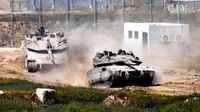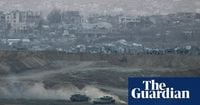Israeli Prime Minister Benjamin Netanyahu announced on May 5, 2025, that Israel is embarking on a new, intensive military operation aimed at capturing and holding territory in Gaza, in a bid to defeat Hamas. In a video shared on social media platform X, Netanyahu stated, "The population will be moved for its own protection," emphasizing that Israeli forces will not conduct raids and retreat as they have in the past. Instead, he asserted, "The intention is the opposite of that." This announcement comes as Israel's security cabinet approved the expansion of military operations, calling up tens of thousands of reservists for what is being termed a significant escalation of the ongoing conflict.
As the humanitarian situation in Gaza continues to deteriorate, with the United Nations and various aid organizations warning of a looming famine due to a total Israeli blockade lasting over two months, the Israeli government is pushing forward with its plans. According to an official source, the expanded operations will involve the conquest of the Gaza Strip, holding the territory, and relocating the civilian population southward for their safety. The Israeli cabinet has discussed a voluntary transfer program for Gaza residents as part of the operation's goals.
The European Union has voiced deep concerns regarding this military strategy, urging Israel to exercise restraint, as it could lead to further casualties and suffering for the Palestinian people. Humanitarian organizations are alarmed, stating that the blockade has resulted in catastrophic conditions for the nearly two million residents of Gaza. The Gaza health ministry reported that over 52,000 Palestinians have died since the resumption of Israeli military operations on March 18, 2025, following a two-month ceasefire that had temporarily halted hostilities.
Amidst these developments, Netanyahu's government has faced criticism for its handling of the situation. Critics argue that the expanded military campaign will jeopardize the lives of hostages still held by Hamas, with approximately 58 individuals remaining in captivity after the militant group's surprise attack on October 7, 2023, which resulted in the deaths of 1,218 people in Israel. An Israeli campaign group representing the families of hostages has accused the government of "sacrificing" those held in Gaza.
Netanyahu's announcement of the offensive, dubbed "Operation Gideon’s Chariots," signifies a shift in Israel's military strategy, as it seeks to establish a sustained presence across much of Gaza. Historically, Israeli forces have operated primarily in a narrow buffer zone along the perimeter of Gaza, but this operation aims to extend their reach significantly. Finance Minister Bezalel Smotrich has publicly embraced the term "occupation," stating, "We are finally going to occupy the Gaza Strip. We will stop being afraid of the word occupation." This rhetoric has raised alarms about the potential long-term implications for the Palestinian population.
The Israeli government hopes that the threat of the new offensive, combined with the mobilization of reservists, will pressure Hamas into concessions during ongoing indirect ceasefire talks. Netanyahu has expressed confidence that the military escalation will assist in the release of hostages held by the militant group. However, the humanitarian situation remains dire, with aid officials describing conditions in Gaza as "absolutely desperate," where residents are reportedly fighting over dwindling resources such as water and food.
In a statement to Sky News, Olga Cherevko from the United Nations Office for the Coordination of Humanitarian Affairs (OCHA) criticized the Israeli plan for aid distribution, labeling it as "in contravention of globally-established humanitarian principles." She warned that the proposal could exacerbate the risks faced by vulnerable populations, particularly those with mobility issues who cannot reach the proposed aid distribution hubs. The UN has rejected the plan as it would likely leave large segments of the population without necessary supplies.
As the situation escalates, the Israeli government has reiterated its commitment to preventing Hamas from distributing humanitarian aid, claiming that such actions would reinforce the group's governance in Gaza. However, humanitarian organizations have dismissed these claims, asserting that the blockade has already caused immense suffering.
In light of these developments, the international community watches closely as tensions rise. The Israeli cabinet has also approved a new mechanism for humanitarian distribution in Gaza, although the specifics of how this will be implemented remain unclear. Critics argue that the plan is not only impractical but also potentially illegal under international law.
Reports indicate that the Israeli military's actions, including the blockade and the new offensive, are part of a broader strategy to assert control over Gaza and its population. As discussions about the future governance of Gaza continue, the likelihood of Israeli troops becoming the de facto rulers of the territory looms large.
As the conflict unfolds, the implications for both the Palestinian civilians and the Israeli hostages remain uncertain. Netanyahu's government faces pressure from various fronts, including calls for a ceasefire and the urgent need to secure the release of hostages. The coming days will be critical as the situation in Gaza develops, with humanitarian organizations calling for immediate action to alleviate the suffering of the civilian population.
With the backdrop of these military operations, the humanitarian crisis in Gaza is expected to worsen, raising ethical questions about the balance between military objectives and the protection of civilian lives. The international community's response will be pivotal in shaping the course of events in the region.


